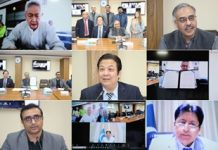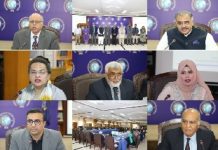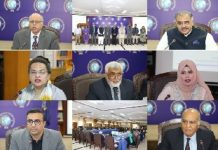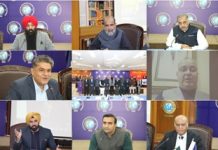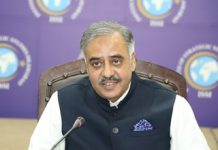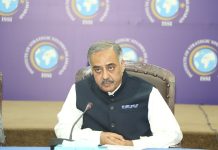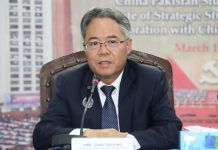Speech by the Chief Guest Federal Minister MoPDSI
PROF. AHSAN IQBAL CHAUDHARY
Concluding Plenary: Islamabad Conclave 2024 – Pakistan and The Evolving
Global Order
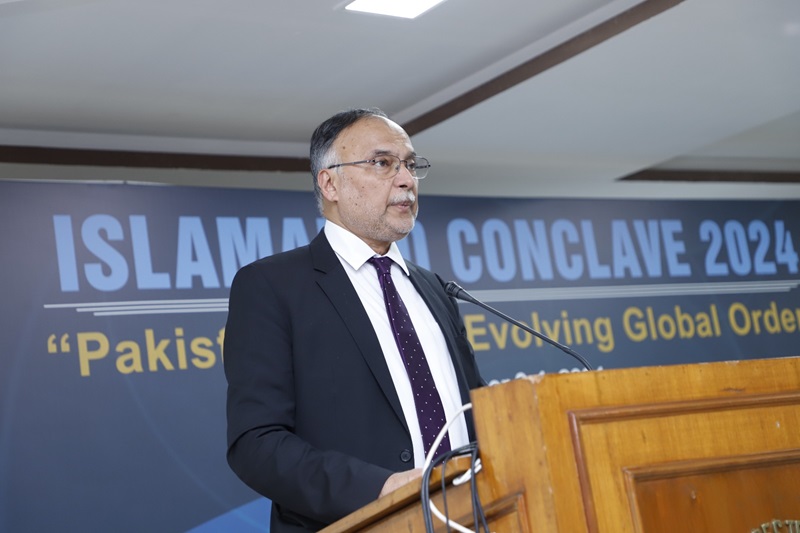
Honorable Chair, Distinguished guests, ladies, and gentlemen
It is both a privilege and a responsibility to address this esteemed audience on a topic that shapes not just Pakistan’s future but the destiny of nations worldwide: Pakistan and the Evolving Global Order.
As we stand at the crossroads of history, the global landscape is undergoing profound shifts that demand our immediate attention and a strategic recalibration of our policies.
Major Power Competition: Navigating Great Power Rivalries
The global order is once again characterized by major power competition. This competition has far-reaching consequences for middle powers like Pakistan. As the world splits into economic and technological blocs, we must navigate this rivalry with caution. Pakistan’s geostrategic location places us at the center of this competition, offering both challenges and opportunities.
Understanding the Shifting Global Landscape
The global order is at an inflection point. The unipolar moment that emerged post-Cold War is gradually giving way to multipolarity. The rise of the Global South, led by countries like China and Russia, challenges the historical dominance of Western powers. Organizations such as BRICS and the Shanghai Cooperation Organization (SCO) are becoming pillars of this new order, emphasizing the principles of equality, mutual respect, and sovereignty.
Pakistan must not only adapt to these changes but position itself as an active contributor. The opportunities for states like ours, especially those located at the crossroads of critical geopolitical regions, are immense. Yet, the challenges are equally daunting, requiring strategic foresight, unity, and purpose
Pakistan’s Strategic Importance in the Evolving Order
As a nuclear state and a key member of the Islamic world, Pakistan holds a unique position. Pakistan’s geostrategic location, at the intersection of South Asia, Central Asia, and the Middle East, positions us as a gateway for trade and energy. Three recent developments illustrate our increasing global relevance:
- Election to the UN Security Council (2025-2026):
This role provides Pakistan a platform to champion the causes of the Global South, advocate for peace, and address pressing issues such as climate change, global inequities, and conflict resolution
- Partnership with China:
Through the China-Pakistan Economic Corridor (CPEC), Pakistan has emerged as a linchpin for regional connectivity. This initiative is not just about infrastructure but symbolizes Pakistan’s integration into a broader vision of shared prosperity and inclusive globalization
- Engagement with Emerging Platforms:
Pakistan’s interest in joining BRICS and its active participation in SCO initiatives signal our commitment to a multipolar and cooperative global system. These platforms allow us to leverage regional dynamics while addressing shared challenges
Balancing Relations with Global Powers
Navigating the complexities of international relations requires delicate balancing.
- U.S.-Pakistan Relations:
America remains Pakistan’s largest export market and an important partner in education, remittances, and counterterrorism. Maintaining this relationship is critical, despite divergent views on some regional policies.
- China-Pakistan Partnership:
Our strategic relationship with China reflects deep mutual trust and cooperation. It is imperative to sustain this alliance while fostering an environment for regional stability.
Addressing Global Challenges
In this evolving world order, Pakistan must take a principled stand on critical issues:
- Climate Action:
As one of the countries most vulnerable to climate change, Pakistan must lead global efforts for sustainability and advocate for equitable climate financing.
- Conflict Resolution:
Whether advocating for the rights of Palestinians or Kashmiris, Pakistan’s foreign policy remains anchored in the principles of international law, justice, and the UN Charter.
- Economic Reforms:
To remain competitive, Pakistan must focus on economic diversification, digital transformation, and fostering innovation.
Evolving Strategic Environment: New Threats and Opportunities
The global strategic environment is no longer defined solely by traditional military power. Economic resilience, technological innovation, and climate security now define a nation’s strategic relevance. Pakistan must adapt to these shifts.
The Indo-Pacific region is emerging as a key arena of global competition, with alliances such as AUKUS (Australia, the UK, and the U.S.) and the Quadrilateral Security Dialogue (Quad) shaping its security architecture. Closer to home, India’s increasing defense collaboration with Western powers adds complexity to our security calculus.
Pakistan must respond with investments in emerging technologies, cybersecurity, and economic stability. Initiatives such as the National AI Policy and Digital Pakistan Vision must be prioritized to ensure our relevance in this era of rapid transformation.
The Way Forward: Pakistan’s Role in the Evolving Global Order
As Pakistan navigates these turbulent waters, we must focus on a few critical priorities:
- Economic Resilience: A strong economy is the foundation of any strategic power. We must prioritize structural reforms, investment in human capital, and regional trade to strengthen our economic base.
- Technological Advancement: Pakistan must leapfrog into the digital age by fostering innovation and aligning with global technological trends.
- Regional Reset: Engaging with neighbors, including India and Afghanistan, on principles of cooperation rather than confrontation will enhance regional peace and economic integration
- National Unity: Domestic stability and cohesion are prerequisites for a proactive and effective foreign policy.
In a rapidly evolving global order, Pakistan has the opportunity to redefine its role. This dialogue is not merely an academic exercise but a call to action. We must harness our collective wisdom to craft policies that secure Pakistan’s rightful place in the world. Together, let us envision a future where Pakistan is not just a participant but a leader in shaping a fairer, more inclusive global order.
Thank you.




